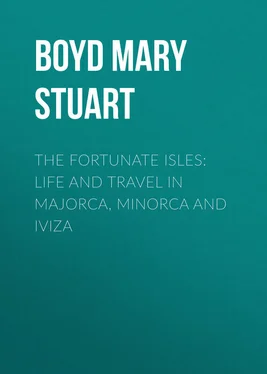Mary Boyd - The Fortunate Isles - Life and Travel in Majorca, Minorca and Iviza
Здесь есть возможность читать онлайн «Mary Boyd - The Fortunate Isles - Life and Travel in Majorca, Minorca and Iviza» — ознакомительный отрывок электронной книги совершенно бесплатно, а после прочтения отрывка купить полную версию. В некоторых случаях можно слушать аудио, скачать через торрент в формате fb2 и присутствует краткое содержание. ISBN: , Жанр: foreign_language, foreign_antique, foreign_prose, Путешествия и география, на английском языке. Описание произведения, (предисловие) а так же отзывы посетителей доступны на портале библиотеки ЛибКат.
- Название:The Fortunate Isles: Life and Travel in Majorca, Minorca and Iviza
- Автор:
- Жанр:
- Год:неизвестен
- ISBN:http://www.gutenberg.org/ebooks/39199
- Рейтинг книги:5 / 5. Голосов: 1
-
Избранное:Добавить в избранное
- Отзывы:
-
Ваша оценка:
- 100
- 1
- 2
- 3
- 4
- 5
The Fortunate Isles: Life and Travel in Majorca, Minorca and Iviza: краткое содержание, описание и аннотация
Предлагаем к чтению аннотацию, описание, краткое содержание или предисловие (зависит от того, что написал сам автор книги «The Fortunate Isles: Life and Travel in Majorca, Minorca and Iviza»). Если вы не нашли необходимую информацию о книге — напишите в комментариях, мы постараемся отыскать её.
The Fortunate Isles: Life and Travel in Majorca, Minorca and Iviza — читать онлайн ознакомительный отрывок
Ниже представлен текст книги, разбитый по страницам. Система сохранения места последней прочитанной страницы, позволяет с удобством читать онлайн бесплатно книгу «The Fortunate Isles: Life and Travel in Majorca, Minorca and Iviza», без необходимости каждый раз заново искать на чём Вы остановились. Поставьте закладку, и сможете в любой момент перейти на страницу, на которой закончили чтение.
Интервал:
Закладка:
A popular article of diet seemed to be the gigantic radishes, in which not only Mundo but all the little shops appeared to do a big trade. We puzzled long over the way in which they could be used before making the chance discovery that they are cut in round slices and eaten raw with soup or meat, as one would eat bread.
III
PALMA, THE PEARL OF THE MEDITERRANEAN
As a place of winter residence for those who like sunshine, and are not enamoured of society, Palma could hardly be excelled.
For one thing, the town is just the right size. It is not so small as to allow the visitor to feel dull, or so large as to permit him to become conscious of his own insignificance.
While Palma is bright and full of movement and of cheerful sounds, it is an adorable place to be lazy in. The sunshine and soft air foster indolence; and though there is no stagnation, everybody takes life easily in this walled city by the southern sea. There is no bustle, no need to hurry. What is not accomplished to-day can be done to-morrow. And if to-morrow finds it still undone – why, what is the future made up of, if not of an illimitable succession of to-morrows?
When the ancients christened Palma "the Pearl of the Mediterranean," they gave it a title that to this day it deserves.
Something of the resplendence of the town is due to the warm-coloured stone of which it is built – a stone that shades from the palest cream to warm amber. Every stroll we took through its mediæval streets, every walk along its antique ramparts, every saunter down the mole, made us more and more in love with its beauty, which we seemed always to be viewing under some new condition of light or atmosphere.
The Man never wearied of the crooked secret-looking streets and fine buildings of the old, old city. By day or night they held for him an inexplicable charm. He was always discovering some new "bit" – a quaint patio , a Moorish arch, an antique gateway, a curious interior, a sculptured window.
And the streets were always full of life. A cluster of officers in full dress chattering on the Borne; a company of soldiers marching to the strains of an inspiriting band; a priest, under a great rose-coloured silk umbrella, on the way to administer extreme unction to someone sick unto death – all the spectators falling on their knees as the solemn little procession passed by; or a party of queerly attired natives of Iviza, just arrived by the thrice-a-week boat, and curiously foreign both in speech and appearance, though their island home was only sixty or seventy miles distant; or a string of carriages whose occupants were on the way to a morning reception at the Almudaina, the old Moorish palace, now the residence of the Captain-General.
Everything in the place was new to us, and the feeling of novelty never waned.
As for the Boy, from the moment of our arrival his interest centred in the port. Its constantly changing array of shipping, and the fine sun-tanned buccaneers who did business on its blue waters, supplied him with endless congenial subjects for pictures.
The port of Palma nestles, one might almost say, right into the heart of the city. The chief promenade, the Borne, ends on its brink. The Cathedral and the Lonja dignify its banks.
The gay life of the harbour lies open to the casual observer. Under the ramparts, by the side of the public road, old men in red caps and suits of velveteen that the sun has faded to marvellous hues sit at their placid occupation of net-mending. There, too, when the falucas are moored at the edge of the wharf, come the families of the fishermen to join them at lunch – the women bringing down wine and bread and the men supplying a tasty hot dish from the less saleable items of their catch. Sometimes a cloth is spread, and then the al fresco repast assumes quite a ceremonious air.
Stern on to the muelle , the long breakwater that partitions off the water of the harbour from the open bay, lie the larger craft: the most important of which are the white-painted steamers of the Isleña Marítima , the fleet of boats belonging to a Majorcan Company that carry mails and passengers between the island and Spain or Algeria.
Once Palma was a great maritime centre. Now little foreign shipping does business in her port. But though the bulk of the traffic is local, an open port always holds the element of the unexpected.
Sometimes a leviathan-like liner, making a holiday tour of Mediterranean ports, anchors by the wharf, and her tourists, eager to make the most of the hours at their disposal, hasten on shore to pack themselves into every available form of conveyance and drive off, enclosed in a pillar of dust of their own raising, to enjoy a hasty glance at Valldemosa, Miramar and Sóller. When at sunset they steam out of the harbour it is with the pleasantly erroneous conviction that they have exhausted the attractions of the island.
Once a fine ship that sharp eyes recognized as the private yacht of the Czar of Russia quietly entered the bay, and after a brief stay, during which her voyagers held no intercourse with land, as quietly departed. And after a spring gale a Greek sailing ship, her main-mast gone, was towed in by a French tug. Sometimes it was the capture of a smuggler's faluca caught in the act of trying to run a cargo of contraband tobacco that furnished the excitement.
On the frequent feast days Palma was gay with flags. Every Consulate in the town – and they were many – mounted its special banner. The gun-boats sported strings of bunting out of all proportion to their size, the merchantmen flew their ensigns, and though the business of the town was transacted with its customary air of casual lightheartedness, the never-lacking holiday feeling was intensified.
One November feast day the Boy, who was painting at the port, discovered among the decorated craft a ship flying the British flag; a closer inspection revealed her to be the Ancona of Leith, just arrived with a cargo of coal. Nearer home I doubt if the proximity of a Leith collier would have appealed strongly to our patriotism. In that southern latitude things were different. A sudden and fervent desire to hear our own northern accent awoke within us, and, incited by our adventurous son, we determined to board the Ancona and pay our respects to her captain.
It was a glorious morning, one of those wonderful mornings when the world seems newly born, that we three went down the mole. Lying beyond the schooner from Sóller, and the pailebot from Valencia that was shipping a cargo of empty wicker-cased wine flasks, we came to the Ancona .
Three railless plank gangways connected her with the wharf, and down two of the planks Majorcans in their elaborately bepatched blue linen suits were carrying straw baskets of coal. We ventured up the third. Our gangway ended on a six-feet-high platform situated on the verge of a hold still brimful of coal. As we hesitated on our perch, wondering what to do next, a bronzed man in slippers appeared. It was the first mate.
"It's a fine day," the Man gave colloquial greeting. "Is the skipper on board?"
"Ay. It's a real bonnie day," the mate made truthful reply. "No. He's just gone up the quay to see the ship's agents."
The homely words, the familiar accent, fell like music on our ears. A few words of explanation brought the mate to our elevated platform, where he spoke with the inherent appreciation of the Scot of the beauty of the town.
"Ay. It's a bonnie place this. I think it's as pretty a place as I've seen. No. We've been busy on board and I haven't had time to see the town yet. But I'm enjoyin' the view fine from here. The captain? Oh, you couldn't miss him. You're sure to come across him. He's just up on the front."
Читать дальшеИнтервал:
Закладка:
Похожие книги на «The Fortunate Isles: Life and Travel in Majorca, Minorca and Iviza»
Представляем Вашему вниманию похожие книги на «The Fortunate Isles: Life and Travel in Majorca, Minorca and Iviza» списком для выбора. Мы отобрали схожую по названию и смыслу литературу в надежде предоставить читателям больше вариантов отыскать новые, интересные, ещё непрочитанные произведения.
Обсуждение, отзывы о книге «The Fortunate Isles: Life and Travel in Majorca, Minorca and Iviza» и просто собственные мнения читателей. Оставьте ваши комментарии, напишите, что Вы думаете о произведении, его смысле или главных героях. Укажите что конкретно понравилось, а что нет, и почему Вы так считаете.











![John Bruce - The Lettsomian Lectures on Diseases and Disorders of the Heart and Arteries in Middle and Advanced Life [1900-1901]](/books/749387/john-bruce-the-lettsomian-lectures-on-diseases-and-disorders-of-the-heart-and-arteries-in-middle-and-advanced-life-1900-1901-thumb.webp)
